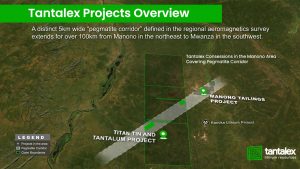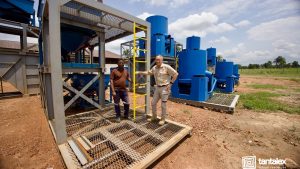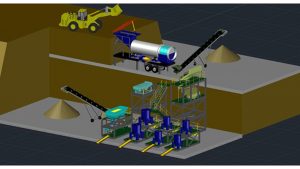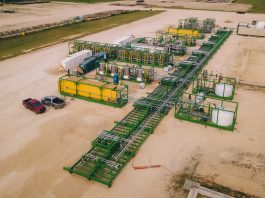Tantalex Lithium Resources Corp., listed on the Canadian (CSE: TTX), American (OTCQB: TTLXF), and Frankfurt (DW8) exchanges, is currently developing its majority-owned flagship project, the Manono lithium tailings project.
Tantalex has completed 13,000m of drilling with all assay results being received. A Maiden Mineral Resource Estimate is due to be released during the month of November.
Additionally, bulk samples from the tailings have been sent to the metallurgical test facilities in South Africa where preliminary heavy liquid separation (HLS) metallurgical test results have confirmed that up to 6.5% Li2O spodumene concentrate is achievable.
Tantalex Lithium has initiated feasibility study work for the production of 6% Li2O spodumene concentrate (SC6). The initial phase of the future production plant would be for a production of approximately 100,000 tpa of SC6 for an initial mine life of six to eight years.
Speed to market is one of the greatest advantages of this project when compared to other developing lithium projects. The company is aiming to have the feasibility study completed by June 2023 and have an investment decision shortly thereafter to pursue the construction of the project.

Projects overview and pegmatite corridor
The relatively small size of the project allows for a quick path to production, using existing road infrastructure and low energy requirements. As a tailings reclamation project, there is very little time required to engineer a mine and mining becomes a very low-cost operation.
With these positive factors, Tantalex Lithium is now aiming for a start of production by early 2025 to become a key lithium producer. According to supply and demand projections, this is the moment when the market will be in its biggest supply deficit.
Manono: A history of mining
The historical Manono-Kitotolo tin mine produced between 140,000 to 185,000 tons of tin and 4,500 tons of coltan concentrate from the pegmatites from 1913 to the 1980s (Zairetain 1981). At the time, the mine was not interested in the lithium resource and only exploited tin and tantalum.

Trial tests of the Titan modular plant in Manono
In 2016, exploration recommenced in Manono with subsurface drilling at the historical mine location, but this time it was for lithium. By 2019, the largest undeveloped hard rock lithium resource in the world (400 million tons grading at 1.65% Li2O) was confirmed, propelling Manono as a key, strategic location for future lithium production.
Tantalex Lithium Resources acquired the majority stake in the legacy tailings and dumps from the old historical mine in 2018. This asset comprises 11 tailings dumps spread throughout the 13km strike from the historical mine. A drone volumetric survey conducted in 2020 confirmed up to 105 million tons of material spread across the 11 dumps.
Bluesky lithium exploration potential
In the Manono region, Tantalex, through its 70% owned subsidiary United Cominiere SAS, also holds two mining concessions totalling 800km², which are immediately adjacent and down from its tailings project and the recently discovered 400-million-ton lithium resource.
These mining concessions are home to a lithium-caesium-tantalum (LCT) pegmatite corridor of 25km strike length, with promising pegmatite outcrops which have not yet been drilled (Fig. 2).
Drilling started in November on identified targets from the aerial geophysics and geological mapping that was performed during the year. A second drill rig will be sourced shortly to accelerate the drilling programme. The potential for a large lithium discovery is quite high and, considering the time it may take to prove a resource and then bring it to market, the faster we can drill, the quicker we can convert the resource into an actual lithium product.
For Tantalex, any additional resources discovered would provide a significant upside as it would be complementary to the already existing processing plant on the Manono lithium tailings project.
Developing a battery minerals supply chain in the DRC
In May 2022, the Democratic Republic of the Congo (DRC) and Zambia signed a historical co-operation agreement to facilitate the development of the value chain in the electric battery and clean energy sector.
The DRC, which is rich in lithium, manganese, nickel, and cobalt, has stated they are adamant about providing the right conditions to produce batteries for electric vehicles (EVs) and develop a ‘green’ value chain. It is worthwhile noting that the DRC has the means to do so because its territory contains all the raw materials needed to create electric batteries. This is obviously the case for cobalt, where around 100,000 tons per year are produced with estimated reserves of 25 million tons, but also for copper, nickel, chromium, and lithium, which the DRC now has the largest undeveloped deposit in the world.
The overall shortage of lithium raw materials has now taken centre stage in the risks inherent to the success of the EV and green revolution. Although there is abundant lithium in the world, developing lithium mines remains the biggest challenge to achieving the EV goals set by most Western governments. Governments and industries worldwide are scrambling to secure resources for their processing facilities in their homeland, whereas the DRC has abundant resources for the EV supply chain on its own territory. There will be much value created for the country but also worldwide with a reduced carbon footprint if the cathode/anode processing factories can be established in the DRC.
Titan project: Tin and tantalum concentrate production
United Cominiere mining concessions are also home to vast cassiterite and coltan alluvial deposits near the surface. The approval by the Ministry of Mines for the transformation of these licenses, from research permits to exploitation concessions in October 2022, has allowed us to proceed with the commencement of the construction of the Titan tin and tantalum concentrate plant.
This plant will be able to produce 120t of tin concentrate and 20t of tantalum concentrates per month, generating important revenues which will allow the development and exploration of our additional assets and create additional value for the Manono region.

Titan plant design
The plant, which has been designed to be modular and easy to mobilise, has now been trial tested in Manono (Fig. 3) and is being mobilised to the site. Commissioning and production are scheduled to start in March 2023.
For Tantalex, the Titan plant is an important milestone as it will generate important revenue for the company and also demonstrates the company’s knowhow in operating in more remote areas. As we are preparing for the construction of the lithium tailing concentrate plant, which will be a much larger project, the acquired experience in building an industrial project in the Manono region brings important added value to the realisation of our future projects.
Why the Manono region?
Manono used to be a thriving mining town but, with the downcycle in the 1980s and the continuous political tumult in the country, investment abated and Manono has suffered from challenging economic conditions since then. Until the Second Congo War (1998-2003), the city was supplied with hydroelectric power from the Mpiana Mwanga dam located 70km away and had its own brewery.
Today, the local population is primarily occupied in subsistence agriculture and artisanal tin and coltan mining. In 2018, a 1 MW solar power plant was built and is now supplying electricity across the city. Big infrastructure projects, like the completion of paved roads, the extension of railway lines, and the power station’s rehabilitation will significantly aid the region’s attractiveness for large-scale investment, not only in the mining sector. An airport serves Manono, and general infrastructure is still good, bearing the marks of the past, but it does need significant upgrades to support large-scale mining operations.
Tantalex is managed by highly experienced directors with multiple years of experience in Africa who are highly motivated to create value for the benefit of shareholders and stakeholders and, most importantly, the communities and the populations who depend on the realisation of Tantalex’s projects for a more prosperous future.
The population of Manono is fully supportive of the mining projects and looks forward to having their city recover the prosperity it once had. Mining projects will be the catalysts to develop many more industries in the region.
Tantalex is committed to local job creation and training the local workforce for specialised work. Additionally, the company aims to deliver on the socio-economic targets for public health services, preservation of the environment, and support for local community initiatives and economic development projects.
Please note, this article will also appear in the twelfth edition of our quarterly publication.









